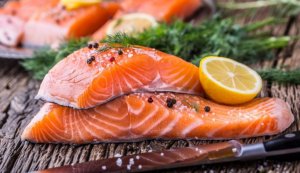Delicious Foods That Are Rich In Omega-3

We all need to eat foods that are rich in omega-3; it’s an essential supplement for our general health. The human body doesn’t produce omega-3 and these are the healthy fats that we need to cleanse and purify our blood.
Omega-3 benefits
These fatty acids (or polyunsaturated fats) reduce blood pressure, cholesterol and triglycerides. As a result, they prevent clots from forming in the arteries.

One important benefit is that they decrease the accumulation of fat in the liver cells, which is known as fatty liver. Likewise, omega-3 helps to prevent heart disease, diabetes and skin disorders.
Including foods that are rich in omega-3 in a balanced diet, accompanied by adequate hydration and a good exercise routine, contributes to eliminating fat and fatty tissue.
Pregnancy and lactation
Omega-3 is a nutritional supplement especially recommended during pregnancy. This is because it helps to reduce risks and complications and provides benefits during lactation.
The amount of omega-3 that you must eat each day, depends on your age and eating habits. Ideally, you should include seeds and nuts in your daily diet. We also recommended eating at least two servings of oily fish per week.
Foods rich in omega-3
Fish: an endless source
The first group of foods that are rich in omega-3 are meat and oily fish:
- Mackerel: contains vitamin B12 (cobalamin), selenium and omega-3. You can usually eat this smoked.
- Salmon: has a high amount of protein and fatty acids. It’s also a source of minerals, such as magnesium, iodine and potassium. It contains selenium, B complex, vitamin A (tocopherol), and vitamin D (calciferol). You can bake it in the oven accompanied by a sauce, or grill it.

- Herring: you can eat this smoked, pre-cooked or canned. It has vitamin D, selenium, vitamin B12 and omega-3.
- Sardines: eaten fresh, canned or preserved are highly nutritious. They provide vitamins B12, vitamin D, selenium and omega-3.
- Anchovies: you can eat these fresh, dehydrated, preserved or in oil. They’re present in olives, rolled in capers and used as an extra ingredient for salads and pizza. They’re amazing as a salad dressing too. Anchovies are a source of niacin and selenium. If they contain bone, their calcium levels increase.
- Cod liver oil: an oil extracted from the liver of this oily fish, which provides vitamin D (calciferol), vitamin A (tocopherol) and omega-3. Only one teaspoon per day is recommended.
- Oily fish oil: provides oleic and linoleic oils. Its commercial presentation contains vitamins and minerals, besides omega-3.
- Caviar: otherwise known as sturgeon roe. It’s usually served as an appetizer or side dish in small quantities. A spoonful provides one gram of omega-3, plus vitamins, magnesium, calcium, potassium, sodium and phosphorus.
Seafood: tasty and healthy
The second group of foods rich in omega-3 is seafood. This is a source of fatty acids, proteins, minerals (iodine) and iron. Crabs, shrimp, lobster and oysters, are true delights for the palate and highly nutritious. Boiled, in sauces or grilled, they’re appetizing culinary treasures.

Oysters stand out for their high content of zinc, cooper, vitamin B12 and omega-3. You can serve them raw or cooked, as an appetizer or as a part of various combined dishes.
Omega-3 in vegetable sources
Cabbage, lettuce and spinach are an extraordinary vegetable source of omega-3. Likewise, broccoli, cauliflower, brussel sprouts and pumpkins shouldn’t be missing from our daily diets. These products, roasted in olive oil, are a delicious dish, and they’re filled with healthy acids.
Cranberries are nutrient-dense fruits of the forest. Mango, pineapple, raspberry, blackberry, cherry, orange, banana and watermelon are also packed with nutrients.
Nuts and seeds
Seeds and nuts bring significant amounts of omega-3 to your body. You can find it in flaxseed, chia seeds, walnuts, almonds and soybeans. This group also includes linseed, canola, soy, wheat and olive oils.
Other foods that are rich in omega-3
- Egg yolk: a source of proteins, vitamins, minerals and lecithin.
- Rabbit meat: rich in omega-3 and low in other fats.
- Meat from grass fed animals.
- Dairy products from grass fed animals.
We all need to eat foods that are rich in omega-3; it’s an essential supplement for our general health. The human body doesn’t produce omega-3 and these are the healthy fats that we need to cleanse and purify our blood.
Omega-3 benefits
These fatty acids (or polyunsaturated fats) reduce blood pressure, cholesterol and triglycerides. As a result, they prevent clots from forming in the arteries.

One important benefit is that they decrease the accumulation of fat in the liver cells, which is known as fatty liver. Likewise, omega-3 helps to prevent heart disease, diabetes and skin disorders.
Including foods that are rich in omega-3 in a balanced diet, accompanied by adequate hydration and a good exercise routine, contributes to eliminating fat and fatty tissue.
Pregnancy and lactation
Omega-3 is a nutritional supplement especially recommended during pregnancy. This is because it helps to reduce risks and complications and provides benefits during lactation.
The amount of omega-3 that you must eat each day, depends on your age and eating habits. Ideally, you should include seeds and nuts in your daily diet. We also recommended eating at least two servings of oily fish per week.
Foods rich in omega-3
Fish: an endless source
The first group of foods that are rich in omega-3 are meat and oily fish:
- Mackerel: contains vitamin B12 (cobalamin), selenium and omega-3. You can usually eat this smoked.
- Salmon: has a high amount of protein and fatty acids. It’s also a source of minerals, such as magnesium, iodine and potassium. It contains selenium, B complex, vitamin A (tocopherol), and vitamin D (calciferol). You can bake it in the oven accompanied by a sauce, or grill it.

- Herring: you can eat this smoked, pre-cooked or canned. It has vitamin D, selenium, vitamin B12 and omega-3.
- Sardines: eaten fresh, canned or preserved are highly nutritious. They provide vitamins B12, vitamin D, selenium and omega-3.
- Anchovies: you can eat these fresh, dehydrated, preserved or in oil. They’re present in olives, rolled in capers and used as an extra ingredient for salads and pizza. They’re amazing as a salad dressing too. Anchovies are a source of niacin and selenium. If they contain bone, their calcium levels increase.
- Cod liver oil: an oil extracted from the liver of this oily fish, which provides vitamin D (calciferol), vitamin A (tocopherol) and omega-3. Only one teaspoon per day is recommended.
- Oily fish oil: provides oleic and linoleic oils. Its commercial presentation contains vitamins and minerals, besides omega-3.
- Caviar: otherwise known as sturgeon roe. It’s usually served as an appetizer or side dish in small quantities. A spoonful provides one gram of omega-3, plus vitamins, magnesium, calcium, potassium, sodium and phosphorus.
Seafood: tasty and healthy
The second group of foods rich in omega-3 is seafood. This is a source of fatty acids, proteins, minerals (iodine) and iron. Crabs, shrimp, lobster and oysters, are true delights for the palate and highly nutritious. Boiled, in sauces or grilled, they’re appetizing culinary treasures.

Oysters stand out for their high content of zinc, cooper, vitamin B12 and omega-3. You can serve them raw or cooked, as an appetizer or as a part of various combined dishes.
Omega-3 in vegetable sources
Cabbage, lettuce and spinach are an extraordinary vegetable source of omega-3. Likewise, broccoli, cauliflower, brussel sprouts and pumpkins shouldn’t be missing from our daily diets. These products, roasted in olive oil, are a delicious dish, and they’re filled with healthy acids.
Cranberries are nutrient-dense fruits of the forest. Mango, pineapple, raspberry, blackberry, cherry, orange, banana and watermelon are also packed with nutrients.
Nuts and seeds
Seeds and nuts bring significant amounts of omega-3 to your body. You can find it in flaxseed, chia seeds, walnuts, almonds and soybeans. This group also includes linseed, canola, soy, wheat and olive oils.
Other foods that are rich in omega-3
- Egg yolk: a source of proteins, vitamins, minerals and lecithin.
- Rabbit meat: rich in omega-3 and low in other fats.
- Meat from grass fed animals.
- Dairy products from grass fed animals.
This text is provided for informational purposes only and does not replace consultation with a professional. If in doubt, consult your specialist.








